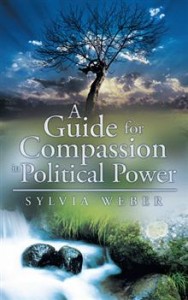 I read A Guide for Compassion in Political Power in search of inspiration. I’m not the most political person in the world, but I wasn’t expecting to gain any political knowledge or strategies out of this. Like the back of the book says, politics are more global than just government, and I was hoping to learn skills to help me bring more compassion to my everyday life. I wanted to be taking rigorous notes that I could turn to any time I felt that I needed a personal refresher. While there were some sections I found interesting, I didn’t end up getting what I wanted out of reading my first ever self improvement book.
I read A Guide for Compassion in Political Power in search of inspiration. I’m not the most political person in the world, but I wasn’t expecting to gain any political knowledge or strategies out of this. Like the back of the book says, politics are more global than just government, and I was hoping to learn skills to help me bring more compassion to my everyday life. I wanted to be taking rigorous notes that I could turn to any time I felt that I needed a personal refresher. While there were some sections I found interesting, I didn’t end up getting what I wanted out of reading my first ever self improvement book.
Sylvia Weber, who has a great resume behind her (clinical nurse specialist at Miriam Hospital, government relations consultant for the RI State Nurses Association and on the board of trustees at American Nurses Association-Political Action Committee), seems to take what she has learned about using compassion through various trainings, conversations and life experiences and puts them together in this brief guide. She defines power as “the ability or capacity to perform,” which is the long way of saying, “get things done.” She discusses power and control, compassion, consciousness and spiritual dimension and how these topics could be used for positive politics. I like when she puts a local spin on things, using the decrepit roads of Rhode Island as an example.
I found it odd that what would usually be considered the body of the book — the section titled “Compassion” — was only 16 pages. The bulk of the book was “Putting it Together” before a brief “Summary.” I was thrown off by the bulk of it putting things together, but maybe that’s just me.
This book seemed to read more like a PowerPoint presentation than anything. I kept waiting to see slides while trying to pay attention to the words on the page. My attention span isn’t what it used to be, and my mind drifted to everything but what I was trying to read. I expected to read this in a day, but it seemed to take weeks for me to get through the 57 pages (80 if you could the first three sections). Reading this taught me that I a) would never be able to pay attention to things long enough to go back to school if I ever decided to tackle that path and b) a lot of this seemed like common sense that I try to do every day, even if I don’t realize the strategies I’m using.
It is clear that this book wasn’t written for my tastes, but that doesn’t mean that it was poorly written or not worth checking out if you’re into this sort of thing. Different strokes, as the cliché says. I do think there are some really good points in the material and would love to see it as a presentation with an engaging speaker and possibly some group work activities. There is something to be gained from everything.